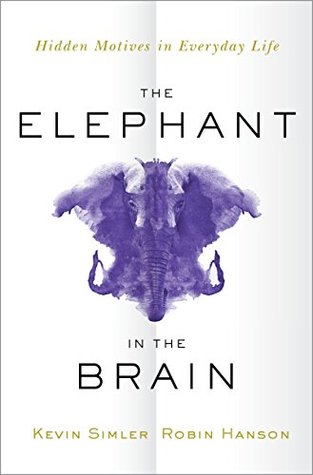More on this book
Community
Kindle Notes & Highlights
by
Kevin Simler
Read between
June 1 - June 23, 2018
This is the religious elephant in the brain: We don’t worship simply because we believe. Instead, we worship (and believe) because it helps us as social creatures.
The fact that these behavioral patterns are so consistent, and thrive even in the absence of supernatural beliefs, strongly suggests that the beliefs are a secondary factor.
In this view, religion isn’t a matter of private beliefs, but rather of shared beliefs and, more importantly, communal practices.
following Durkheim, we should note that God often functions as a symbol for society. So whenever people make a sacrifice to your god, they’re implicitly showing loyalty to you—and to everyone else who worships at the same altar.31
rituals of sacrifice are honest signals whose cost makes them hard to fake.
Yes, you probably have “better things to do” than listen to a sermon, which is precisely why you get loyalty points for listening patiently. In other words, the boredom of sermons may be a feature rather than a bug.
All these sacrifices work to maintain high levels of commitment and trust among community members, which ultimately reduces the need to monitor everyone’s behavior.38 The net result is the ability to sustain cooperative groups at larger scales and over longer periods of time.39
In fact, Americans would sooner see a Muslim than an atheist in the Oval Office.41 An atheist kneels before no one, and for many voters, this is a frightening proposition.
Why shouldn’t an individual woman be allowed to use birth control? But in a tight-knit community, each woman’s “individual” choices have social externalities. If you’re using birth control, you’re also more likely to delay marriage, get an advanced degree, and pursue a dynamic, financially rewarding career. This makes it harder on your more traditional, family-oriented neighbors. Your lifestyle interferes with theirs (and vice versa), and avoiding such tensions is largely why we self-segregate into communities in the first place.
“people acting in synchrony with others cooperated more in subsequent group economic exercises, even in situations requiring personal sacrifice.”50
sermons generate common knowledge of the community’s norms.
The more fervently we profess belief in such a god, the more we’ll develop a reputation for doing right at all times, even when other people aren’t watching.56 This kind of reputation is especially attractive in those we seek as leaders, since they have a lot of room to behave badly behind closed doors.
as long as everyone within a sect believes the same thing, it works as an effective badge. And if the belief happens to be a little weird, a little stigmatizing in the eyes of nonbelievers, then it also functions as a sacrifice.
people mostly don’t vote for their material self-interest, that is, for the candidates and policies that would make them personally better off.
When people are asked the same policy question a few months apart, they frequently give different answers—not because they’ve changed their minds, but because they’re making up answers on the spot, without remembering what they said last time.
You cannot express negative sentiments about social groups in this day and age. But political identities are not protected by these constraints. A Republican is someone who chooses to be Republican, so I can say whatever I want about them.
Political scientists often distinguish between “instrumental voting” and “expressive voting.”
This helps explain why voters feel little pressure to be informed. As long as we adopt the “right” beliefs—those of our main coalitions—we get full credit for loyalty. We don’t need to be well informed because the truth isn’t particularly relevant to our expressive agendas.
The fact that we use political beliefs to express loyalty, rather than to take action, also explains why we’re emotionally attached to our beliefs, and why political discussions often generate more heat than light.
While intellectuals have at times tried to explain the one key moral dimension that underlies most political disputes, in fact, different societies at different times have had quite different main political dimensions.
Why should humble citizens (read: selfish primates) care what happens in distant halls of power—especially regarding actions in the political arena, like voting, which are mostly futile? Aren’t we better off minding our own business and tending to local issues, like those at home and in the workplace? The answer we’ve given in this chapter is that we use far-off national politics as a medium in which to jockey for local advantages.
we ignore the elephant because doing so is strategic. Self-deception allows us to act selfishly without having to appear quite so selfish in front of others.
even when we simply acknowledge the elephant to ourselves, in private, we burden our brains with self-consciousness and the knowledge of our own hypocrisy.
A good rule of thumb for applying “hidden motive” explanations is not to use them in the second person, but only in first and third (and ideally in the plural).


